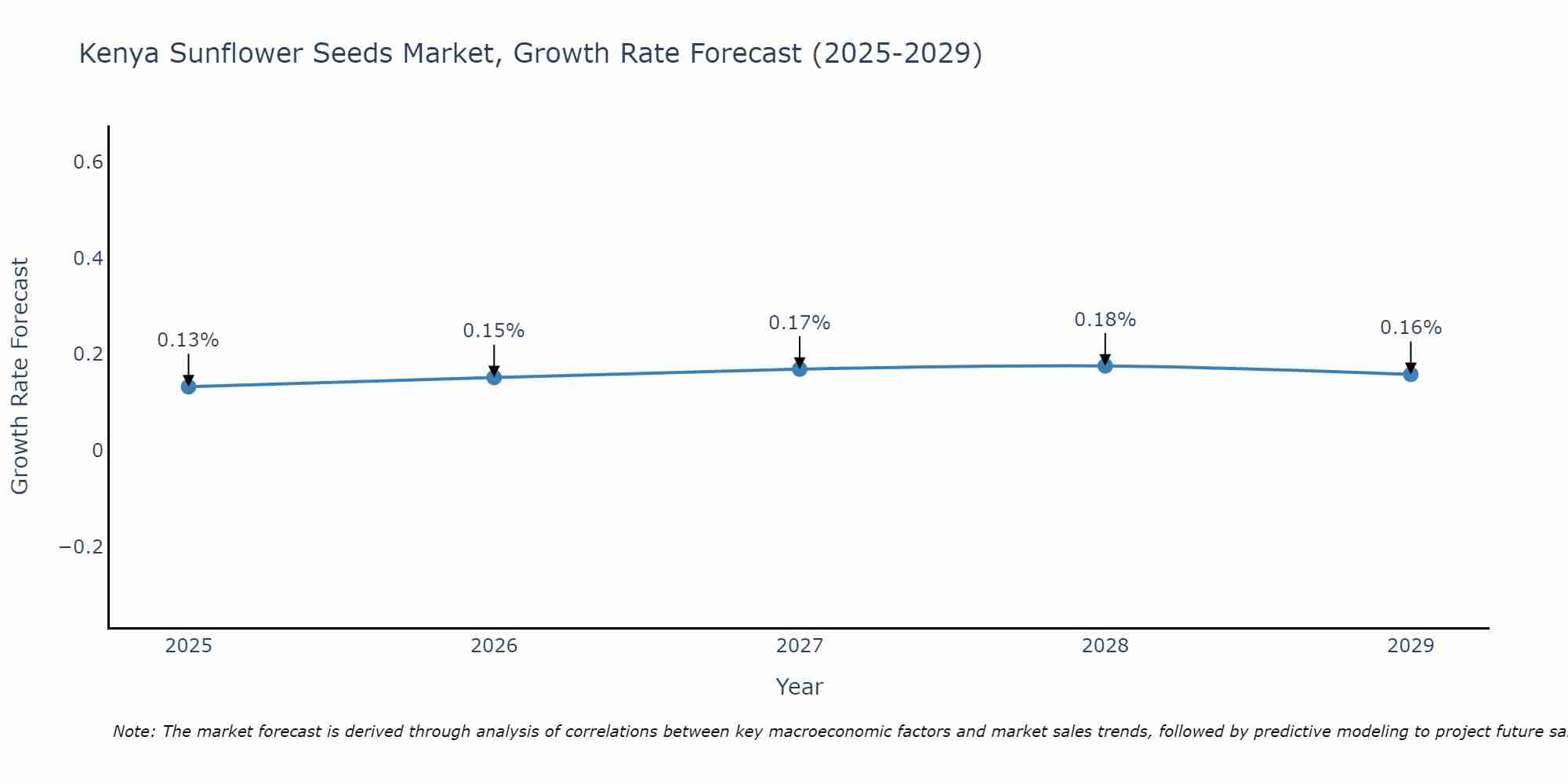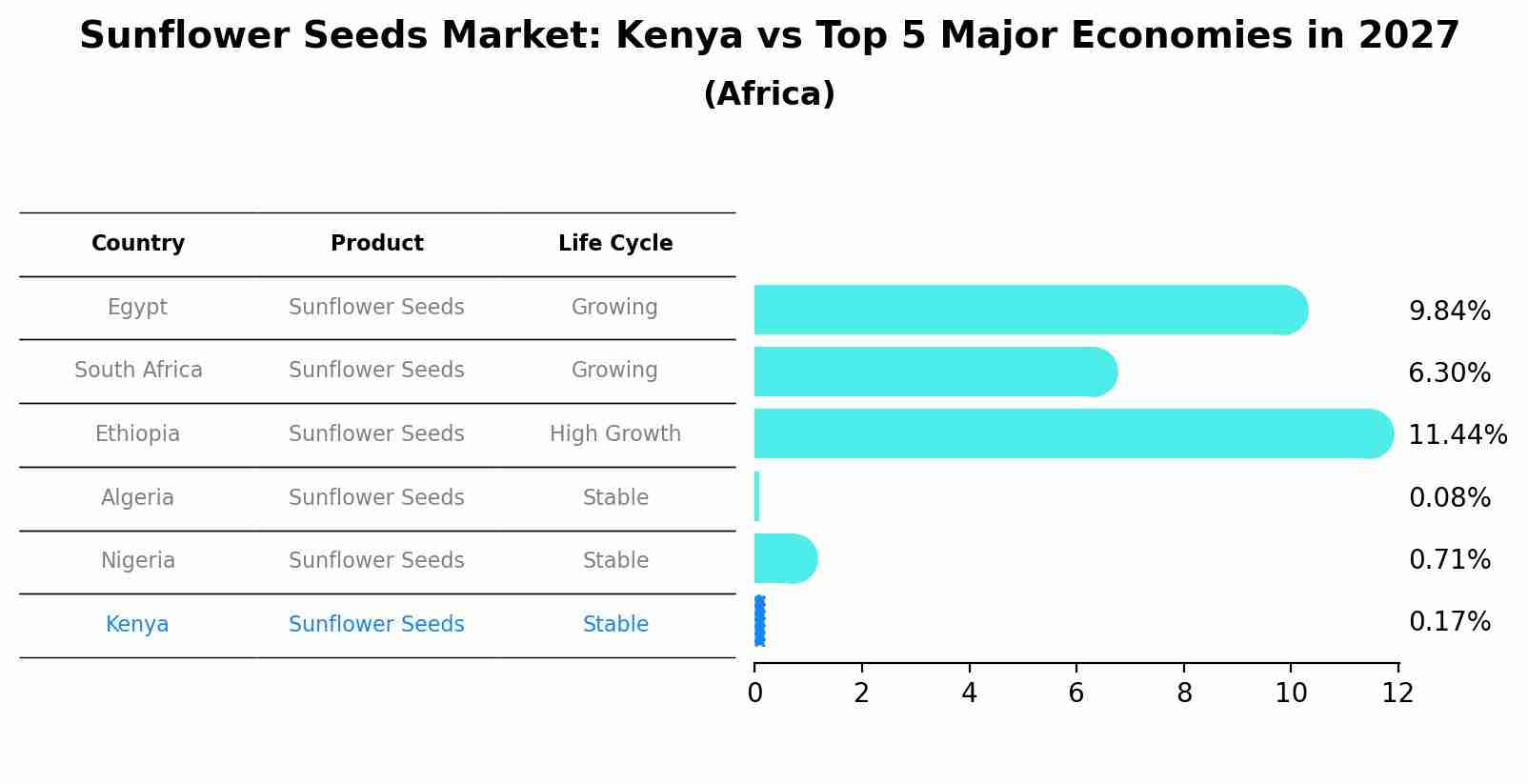Kenya Sunflower Seeds Market Outlook | Companies, Size, Revenue, Share, Trends, Analysis, Growth, Value, COVID-19 IMPACT, Industry & Forecast
| Product Code: ETC225050 | Publication Date: Aug 2022 | Updated Date: Aug 2025 | Product Type: Market Research Report | |
| Publisher: 6Wresearch | Author: Ravi Bhandari | No. of Pages: 75 | No. of Figures: 35 | No. of Tables: 20 |
Kenya Sunflower Seeds Market Size Growth Rate
The Kenya Sunflower Seeds Market is projected to witness mixed growth rate patterns during 2025 to 2029. Starting at 0.13% in 2025, the market peaks at 0.18% in 2028, and settles at 0.16% by 2029.

Sunflower Seeds Market: Kenya vs Top 5 Major Economies in 2027 (Africa)
By 2027, Kenya's Sunflower Seeds market is forecasted to achieve a stable growth rate of 0.17%, with Egypt leading the Africa region, followed by South Africa, Ethiopia, Algeria and Nigeria.

Kenya Sunflower Seeds Market Overview
The Kenya sunflower seeds market is experiencing steady growth driven by increasing awareness of the health benefits of sunflower seeds, such as being a good source of vitamins, minerals, and antioxidants. The market is primarily driven by the growing demand for healthy snacks and cooking oils. Additionally, the rising popularity of organic and natural products among consumers is boosting the demand for sunflower seeds in Kenya. Key players in the market are focusing on product innovation, packaging, and marketing strategies to attract more consumers. The market is also witnessing a trend towards sustainable and environmentally friendly practices in sunflower seed cultivation. Overall, the Kenya sunflower seeds market is poised for further growth as consumer preferences shift towards healthier and natural food options.
Kenya Sunflower Seeds Market Trends
In the Kenya Sunflower Seeds Market, a notable trend is the increasing consumer demand for healthy and natural food products, leading to a growing popularity of sunflower seeds as a nutritious snack option. Additionally, there is a rising awareness among consumers about the health benefits of sunflower seeds, such as being rich in essential nutrients like vitamin E, magnesium, and selenium. The market is also witnessing a surge in the use of sunflower seeds in various culinary applications, including baking, cooking, and as an ingredient in salads and smoothies. Furthermore, the emphasis on sustainable and locally sourced products is driving the preference for sunflower seeds produced by domestic farmers, supporting the growth of the local sunflower seeds market.
Kenya Sunflower Seeds Market Challenges
In the Kenya Sunflower Seeds Market, some challenges include limited access to quality inputs such as fertilizers and pesticides, which affects crop yields and overall product quality. Additionally, inconsistent weather patterns and climate change impact sunflower production, leading to fluctuations in supply. Lack of modern farming techniques and machinery also hinders productivity and efficiency in the sector. Furthermore, inadequate market infrastructure and storage facilities result in post-harvest losses and lower profitability for farmers. Lastly, competition from imported sunflower products poses a threat to local producers, especially in terms of price competitiveness. Overall, addressing these challenges through improved infrastructure, technology adoption, and market access strategies is crucial for the sustainable growth of the Kenya sunflower seeds market.
Kenya Sunflower Seeds Market Investment Opportunities
The Kenya Sunflower Seeds Market offers promising investment opportunities due to increasing consumer awareness of the health benefits associated with sunflower seeds such as high protein content, essential nutrients, and antioxidants. The market is characterized by a growing demand for sunflower seeds as a healthy snack option and as an ingredient in various food products. Investors can explore opportunities in sunflower seed production, processing, and distribution to capitalize on the rising demand. Additionally, there is potential for value-added products like sunflower seed oil, which has various culinary and cosmetic applications. With Kenya being a major agricultural hub in East Africa, investing in the sunflower seeds market presents a sustainable and profitable venture for investors looking to tap into the health food industry.
Kenya Sunflower Seeds Market Government Policy
The Kenyan government has implemented various policies to support the sunflower seeds market in the country. These policies include subsidies for sunflower seed farmers to enhance production, promote research and development for improved seed varieties, and provide training and extension services to farmers. Additionally, the government has put in place regulations to ensure quality control and safety standards in the sunflower seed industry. Furthermore, there are initiatives to increase access to credit and markets for sunflower seed farmers, as well as efforts to promote value addition and agro-processing of sunflower seeds. Overall, these government policies aim to boost the competitiveness and sustainability of the sunflower seeds market in Kenya while supporting the livelihoods of farmers in the sector.
Kenya Sunflower Seeds Market Future Outlook
The Kenya sunflower seeds market is anticipated to experience steady growth in the coming years due to increasing awareness of the health benefits associated with sunflower seeds. The rise in demand for natural and nutritious food products, coupled with the growing popularity of plant-based diets, is expected to drive market growth. Additionally, the expanding food processing industry in Kenya and the rising disposable income of consumers are likely to contribute to the market`s expansion. With an emphasis on sustainable agriculture practices and the government`s support for the farming sector, the sunflower seeds market in Kenya is poised for a positive outlook, offering opportunities for both domestic production and export potential.
Key Highlights of the Report:
- Kenya Sunflower Seeds Market Outlook
- Market Size of Kenya Sunflower Seeds Market, 2021
- Forecast of Kenya Sunflower Seeds Market, 2031
- Historical Data and Forecast of Kenya Sunflower Seeds Revenues & Volume for the Period 2018 - 2031
- Kenya Sunflower Seeds Market Trend Evolution
- Kenya Sunflower Seeds Market Drivers and Challenges
- Kenya Sunflower Seeds Price Trends
- Kenya Sunflower Seeds Porter's Five Forces
- Kenya Sunflower Seeds Industry Life Cycle
- Historical Data and Forecast of Kenya Sunflower Seeds Market Revenues & Volume By Type for the Period 2018 - 2031
- Historical Data and Forecast of Kenya Sunflower Seeds Market Revenues & Volume By Open Pollinated for the Period 2018 - 2031
- Historical Data and Forecast of Kenya Sunflower Seeds Market Revenues & Volume By Hybrids for the Period 2018 - 2031
- Kenya Sunflower Seeds Import Export Trade Statistics
- Market Opportunity Assessment By Type
- Kenya Sunflower Seeds Top Companies Market Share
- Kenya Sunflower Seeds Competitive Benchmarking By Technical and Operational Parameters
- Kenya Sunflower Seeds Company Profiles
- Kenya Sunflower Seeds Key Strategic Recommendations
Frequently Asked Questions About the Market Study (FAQs):
1 Executive Summary |
2 Introduction |
2.1 Key Highlights of the Report |
2.2 Report Description |
2.3 Market Scope & Segmentation |
2.4 Research Methodology |
2.5 Assumptions |
3 Kenya Sunflower Seeds Market Overview |
3.1 Kenya Country Macro Economic Indicators |
3.2 Kenya Sunflower Seeds Market Revenues & Volume, 2021 & 2031F |
3.3 Kenya Sunflower Seeds Market - Industry Life Cycle |
3.4 Kenya Sunflower Seeds Market - Porter's Five Forces |
3.5 Kenya Sunflower Seeds Market Revenues & Volume Share, By Type, 2021 & 2031F |
4 Kenya Sunflower Seeds Market Dynamics |
4.1 Impact Analysis |
4.2 Market Drivers |
4.2.1 Increasing awareness about the health benefits of sunflower seeds |
4.2.2 Growing demand for natural and organic food products |
4.2.3 Favorable government policies supporting sunflower farming |
4.3 Market Restraints |
4.3.1 Fluctuations in weather conditions affecting sunflower seed production |
4.3.2 Competition from other oilseed crops |
4.3.3 Limited access to advanced agricultural technologies and practices |
5 Kenya Sunflower Seeds Market Trends |
6 Kenya Sunflower Seeds Market, By Types |
6.1 Kenya Sunflower Seeds Market, By Type |
6.1.1 Overview and Analysis |
6.1.2 Kenya Sunflower Seeds Market Revenues & Volume, By Type, 2021-2031F |
6.1.3 Kenya Sunflower Seeds Market Revenues & Volume, By Open Pollinated, 2021-2031F |
6.1.4 Kenya Sunflower Seeds Market Revenues & Volume, By Hybrids, 2021-2031F |
7 Kenya Sunflower Seeds Market Import-Export Trade Statistics |
7.1 Kenya Sunflower Seeds Market Export to Major Countries |
7.2 Kenya Sunflower Seeds Market Imports from Major Countries |
8 Kenya Sunflower Seeds Market Key Performance Indicators |
8.1 Average yield per hectare of sunflower seeds |
8.2 Adoption rate of sustainable farming practices in sunflower cultivation |
8.3 Percentage of sunflower seed farmers using certified seeds |
9 Kenya Sunflower Seeds Market - Opportunity Assessment |
9.1 Kenya Sunflower Seeds Market Opportunity Assessment, By Type, 2021 & 2031F |
10 Kenya Sunflower Seeds Market - Competitive Landscape |
10.1 Kenya Sunflower Seeds Market Revenue Share, By Companies, 2021 |
10.2 Kenya Sunflower Seeds Market Competitive Benchmarking, By Operating and Technical Parameters |
11 Company Profiles |
12 Recommendations |
13 Disclaimer |
- Single User License$ 1,995
- Department License$ 2,400
- Site License$ 3,120
- Global License$ 3,795
Search
Related Reports
- ASEAN Bearings Market (2025-2031) | Strategy, Consumer Insights, Analysis, Investment Trends, Opportunities, Growth, Size, Share, Industry, Revenue, Segments, Value, Segmentation, Supply, Forecast, Restraints, Outlook, Competition, Drivers, Trends, Demand, Pricing Analysis, Competitive, Strategic Insights, Companies, Challenges
- Europe Flooring Market (2025-2031) | Outlook, Share, Industry, Trends, Forecast, Companies, Revenue, Size, Analysis, Growth & Value
- Saudi Arabia Manlift Market (2025-2031) | Outlook, Size, Growth, Trends, Companies, Industry, Revenue, Value, Share, Forecast & Analysis
- Uganda Excavator, Crane, and Wheel Loaders Market (2025-2031) | Strategy, Consumer Insights, Analysis, Investment Trends, Opportunities, Growth, Size, Share, Industry, Revenue, Segments, Value, Segmentation, Supply, Forecast, Restraints, Outlook, Competition, Drivers, Trends, Demand, Pricing Analysis, Competitive, Strategic Insights, Companies, Challenges
- Rwanda Excavator, Crane, and Wheel Loaders Market (2025-2031) | Strategy, Consumer Insights, Analysis, Investment Trends, Opportunities, Growth, Size, Share, Industry, Revenue, Segments, Value, Segmentation, Supply, Forecast, Restraints, Outlook, Competition, Drivers, Trends, Demand, Pricing Analysis, Competitive, Strategic Insights, Companies, Challenges
- Kenya Excavator, Crane, and Wheel Loaders Market (2025-2031) | Strategy, Consumer Insights, Analysis, Investment Trends, Opportunities, Growth, Size, Share, Industry, Revenue, Segments, Value, Segmentation, Supply, Forecast, Restraints, Outlook, Competition, Drivers, Trends, Demand, Pricing Analysis, Competitive, Strategic Insights, Companies, Challenges
- Angola Excavator, Crane, and Wheel Loaders Market (2025-2031) | Strategy, Consumer Insights, Analysis, Investment Trends, Opportunities, Growth, Size, Share, Industry, Revenue, Segments, Value, Segmentation, Supply, Forecast, Restraints, Outlook, Competition, Drivers, Trends, Demand, Pricing Analysis, Competitive, Strategic Insights, Companies, Challenges
- Israel Intelligent Transport System Market (2025-2031) | Strategy, Consumer Insights, Analysis, Investment Trends, Opportunities, Growth, Size, Share, Industry, Revenue, Segments, Value, Segmentation, Supply, Forecast, Restraints, Outlook, Competition, Drivers, Trends, Demand, Pricing Analysis, Competitive, Strategic Insights, Companies, Challenges
- Uganda Precast and Aggregate Market (2025-2031) | Strategy, Consumer Insights, Analysis, Investment Trends, Opportunities, Growth, Size, Share, Industry, Revenue, Segments, Value, Segmentation, Supply, Forecast, Restraints, Outlook, Competition, Drivers, Trends, Demand, Pricing Analysis, Competitive, Strategic Insights, Companies, Challenges
- Australia IT Asset Disposal Market (2025-2031) | Strategy, Consumer Insights, Analysis, Investment Trends, Opportunities, Growth, Size, Share, Industry, Revenue, Segments, Value, Segmentation, Supply, Forecast, Restraints, Outlook, Competition, Drivers, Trends, Demand, Pricing Analysis, Competitive, Strategic Insights, Companies, Challenges
Industry Events and Analyst Meet
Our Clients
Whitepaper
- Middle East & Africa Commercial Security Market Click here to view more.
- Middle East & Africa Fire Safety Systems & Equipment Market Click here to view more.
- GCC Drone Market Click here to view more.
- Middle East Lighting Fixture Market Click here to view more.
- GCC Physical & Perimeter Security Market Click here to view more.
6WResearch In News
- Doha a strategic location for EV manufacturing hub: IPA Qatar
- Demand for luxury TVs surging in the GCC, says Samsung
- Empowering Growth: The Thriving Journey of Bangladesh’s Cable Industry
- Demand for luxury TVs surging in the GCC, says Samsung
- Video call with a traditional healer? Once unthinkable, it’s now common in South Africa
- Intelligent Buildings To Smooth GCC’s Path To Net Zero













